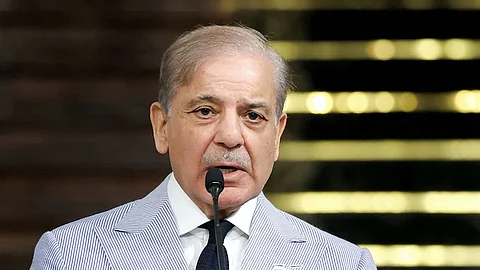
- Home
- Live Blog
- Breaking News
- Top Headlines
- Cities
- NE News
- Sentinel Media
- Sports
- Education
- Jobs

ISLAMABAD – Escalating tensions over the Indus Waters Treaty, Pakistan Prime Minister Shehbaz Sharif has issued a sharp warning to India, vowing that Islamabad will not allow New Delhi to divert or block even "one drop" of water that rightfully belongs to Pakistan under the 1960 accord.
Speaking at an event in Islamabad marking International Youth Day, Sharif called the Indus waters the "lifeblood" of Pakistan and declared there would be "no compromise" on the country's rights. "You threaten to stop our water. If you attempt such a move, Pakistan will teach you a lesson you will never forget," he said, as quoted by The Express Tribune.
His remarks follow Pakistan's formal appeal to India earlier this week, urging New Delhi to restore the "normal functioning" of the treaty. India had put the agreement in abeyance in May following the deadly Pahalgam terror attack, which was carried out by Pakistan-based terror groups.
A Chorus of Threats from Pakistan
Sharif's fiery comments echo recent war rhetoric from top Pakistani figures. Foreign Minister Bilawal Bhutto accused India of causing "great damage" to Pakistan by suspending the treaty and called on citizens to unite against Prime Minister Narendra Modi.
Even more alarming was Pakistan Army Chief Asim Munir’s threat during a US visit, where he warned of nuclear conflict and claimed Pakistan could “take down half the world” if faced with an existential threat from India.
India’s Ministry of External Affairs condemned Munir's statement, calling it "nuclear sabre-rattling" and criticised the remarks being made from the territory of a friendly third country.
India Presses Ahead with Hydropower Project
Despite Pakistan’s protests, India is moving forward with its largest-ever hydroelectric project on the Chenab River in Jammu and Kashmir. The 1,856 MW plant is being constructed without Pakistan’s prior consent, which is typically required under the Indus Waters Treaty.
Signed in 1960 with World Bank mediation, the treaty grants India control over the eastern rivers (Beas, Ravi, Sutlej) and Pakistan rights over the western rivers (Indus, Jhelum, Chenab). With both nations hardening their stances, fears of a broader conflict over water are once again rising.
Bottom of Form